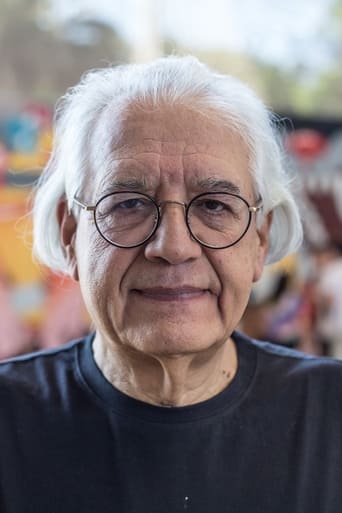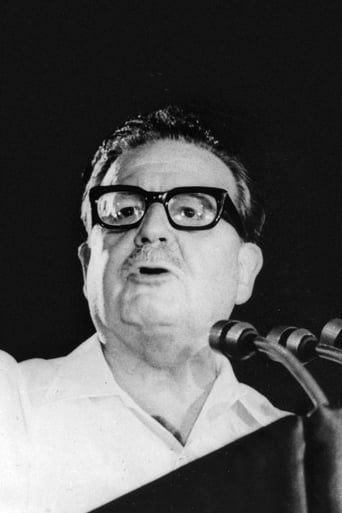VeteranLight
I don't have all the words right now but this film is a work of art.
Comwayon
A Disappointing Continuation
FuzzyTagz
If the ambition is to provide two hours of instantly forgettable, popcorn-munching escapism, it succeeds.
Rosie Searle
It's the kind of movie you'll want to see a second time with someone who hasn't seen it yet, to remember what it was like to watch it for the first time.
dromasca
28 years before 9/11, there was another 9/11 which represented a key date in the history of Chile, South America and the whole world. This was the date in 1973 when a bloody coup in Chile deposed Salvador Allende the first Marxist president elected democratically anywhere in the world and put an end to the Chilean experiment of a democratic transition from capitalism to socialism. Allende committed suicide when the armed forces attacked the presidential palace.Unfortunately this film is too biased and too nostalgic towards the time of Allende's rule to be an objective rendition of the man and of his place in history. The times were troubled and Allende was a disputed figure in the history of his country and of the whole world. True, he was democratically elected, but his policies plunged Chile into economic crisis. He was deposed by a coup and a right-wing dictatorship followed with repression and flagrant human rights abuses, but he was also an ally of Castro who saw in his policies another way of making revolution. We'll never know if his tentative to build a socialist yet democratic society would have succeeded. The authors of the movie take a completely pro-Allende position, there is no opinion or point of view trying to explain the other side, to answer questions like why did the middle class oppose him, or how his democratic views could go together with supporting or being supported by Castro. The tone of the commentaries is nostalgic and apologetic, almost propagandistic. People who want to get a better understanding of this episode of the history need to wait for a more balanced and objective film or book in the future.
palmiro
This is a tragic, moving tale of a courageous political leader who tried to make the world a better place for the most disadvantaged of his country's citizens. Ironically, it's the interviews with the US ex-ambassador to Chile which seem the most insightful. The ambassador got it exactly right: Allende never had a chance. The forces arrayed against Allende in his attempt to transform Chile into a democratic socialist regime were simply overwhelming: the US, international finance capital, the Chilean bourgeoisie, most of the Chilean middle classes, and the Chilean army. In a sense, Allende should have known better: he had before him the unsuccessful examples of republican Spain in the '30s and Guatemala in the '50s. In neither case had it been possible to introduce far- reaching social and economic reforms which aroused the unconditional hostility of the capitalist ruling class and neighboring reactionary states. And Allende would have had no more success if he had armed the workers and campesinos, since the Chilean army showed no signs of demoralization and disintegration—the conditions under which a "people's army" has a chance to triumph over a well-armed, disciplined professional army. The people in the people's army would have been slaughtered tout court. Perhaps his only chance came with the assassination of Rene Schneider, Allende's pick as head of the Chilean armed forces. He could have used the assassination as an excuse for a thorough house- cleaning of the military high command, assuming he could have found some of Latin-America's famous "left-wing colonels" who would have been necessary to carry out the purge. But it would have been a risky proposition that just as easily could have precipitated the military coup that came 3 years later. The film should also prompt some rethinking of the concept of the "dictatorship of the proletariat"—a concept that's had rather bad press in recent decades. One of Allende's closest friends tells us that Allende was a committed Marxist socialist but certainly not a Leninist, because he did not believe in the dictatorship of the proletariat. Allende, we're told, believed in democracy. But the problem was that the democracy Allende believed in was in reality a dictatorship of another kind: the dictatorship of the bourgeoisie. Despite its façade of multi-party elections, Chilean democracy was a stacked deck, inevitably manipulated in favor of the ruling classes.So Lenin was right: only by forcing the collapse of the coercive apparatus sustaining the rule of the bourgeoisie could the working classes create a state that serves their interests. What distinguishes the dictatorship of the proletariat from the dictatorship of the bourgeoisie is not that one is a multi-party system and the other a single party system (there's no lack of single-party states in the history of the rule of the bourgeoisie). Rather, it's the stacking of the deck in favor of working people versus stacking it in favor of the owners of capital.
stursan
The film takes the spectator, but especially the '68 generation back to those years when youth, in many parts of the world, was so far from each other in distance, yet so close to each other in their ideologies. I feel grateful that Guzman has produced this film to renew our memories; to show and remind the younger generations what their parents had suffered in such countries for their thoughts or ideology. A respectful tribute and a powerful example of a leader with dignity.Last but not least, the music of Quilapayun, Inti Illimani, and Victor Jara is bound to create a bitter-sweet nostalgia in anyone who had admired them in those years.
James McNally
I saw this film at the 2004 Toronto International Film Festival. September 11 will forever be remembered in this country as the anniversary of the attacks that brought down the World Trade Center. But it's also the anniversary of the death of Salvador Allende, the democratically elected president of Chile whose government was brought down by a CIA- backed coup d'etat in 1973. Director Guzmán has spent his entire film-making career documenting and exploring the tragic recent history of his country, and with this film he finally turns to Allende, a hero to Chile's political left. The coup that resulted in his death led to 18 years of brutal dictatorship under General Augusto Pinochet, a dark period from which the country hasn't entirely emerged.A deeply personal portrait, the film probably makes more sense in the context of Guzmán's other films. For someone who doesn't have much background on Chile, it can be a bit maddening since it assumes a familiarity with the history of Chilean politics. Early film of Allende campaigning for president is quite moving, though. The director has mostly been based in Paris since he fled Chile after the coup, and it's clear that the Chile to which he returns doesn't have much time for him. His interviews with old Socialist Party members are touching, but seem only nostalgic. He doesn't talk to anyone from the current political scene, and an interview with the former US ambassador appears to have been conducted by someone else, a long time ago.The fact that no official biography of Allende has ever been published in Chile is remarkable. It's almost as if Chileans want not only to forget the nightmare of Pinochet, but also the dream of utopia that Allende offered beforehand. Sadly, at this point in Chile's history, Guzmán seems a bit like one of the old comrades he interviews: condemned to irrelevance.On the other hand, the parallels between Allende and current Venezuelan president Hugo Chavez are remarkable, including the opposition's tactics of strikes and economic protests. It is no wonder that Chavez suspects US involvement in the coup that nearly toppled his government in 2002. In that coup, while Chavez and his ministers were holed up in the presidential palace, the army threatened to bomb the building, a threat that was actually carried out by the Chilean military in 1973. The footage shot by Guzmán of that event is particularly chilling. My hope is that Allende's idealism and commitment to peaceful change are a beacon for Chavez, and indeed for all the people of Latin America and the rest of the world. He was one of the first heads of state to warn about the dangers of multinational corporations, for instance, and it is clearer than ever that the struggle of the world's people is no longer about Cold War allegiances and ideologies, but against rampant global capitalism and the consumerism that feeds it. Guzmán said he wanted to make this film for young people. Perhaps in a few years' time, he can make another film in Chile, not about old soldiers, but about young ones.

